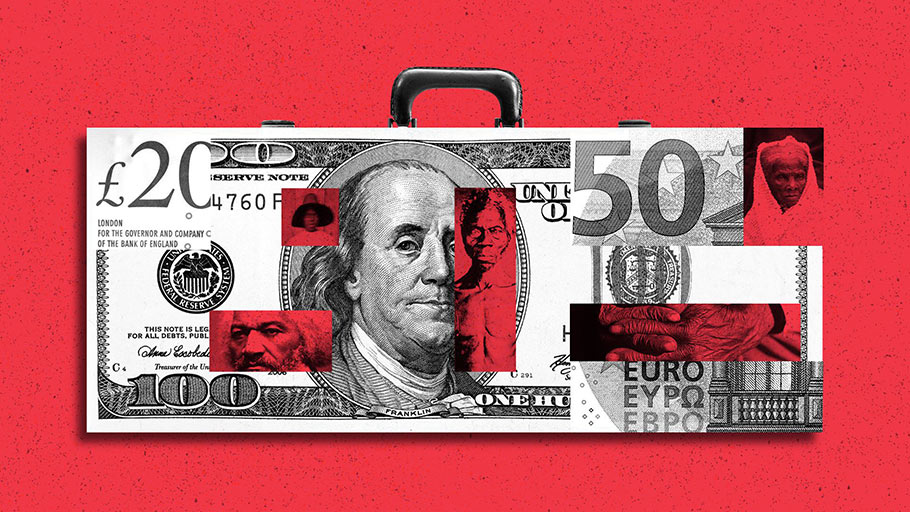Note: Dr. Ron Daniels, President of the Institute of the Black World 21st Century and Convener of the National African Reparations Commission (NAARC) is quoted in this article.
The debate over reparations for slavery has moved from the political realm to the corporate one. At least two big British companies — insurer Lloyd’s of London and brewer Greene King — promised to make certain amends for their role in slavery. But activists want them and other companies to do more.
Why it matters: We usually hear about reparations as a political issue — a “societal obligation” of the federal government, as The New York Times’ Nikole Hannah-Jones wrote this week. But corporations, too, are being called out for how their involvement in slavery — and their modern-day policies and practices — perpetuate racism.
Driving the news: Protests over systemic racism have pushed more of the world’s oldest institutions to reckon with how they profited from slavery.
- Lloyd’s of London, the world’s largest insurance marketplace, apologized for insuring slaving ships in a release earlier this month. The334-year old company was sued in 2004 by descendants of Black American slaves, but this is the first time Lloyd’s listed out remedies for its history.
- Among them: reviewing its policies to “ensure they are explicitly non-racist and providing “financial support” to charities that support Black and minority ethnic groups.
- The company did not respond to questions about how much they’re giving or which organizations they’ll support.
Greene King, the biggest pub and brewery company in the U.K., was founded in 1799 by a man who owned slaves and argued against abolition. The company now plans to make a “substantial investment” to support the Black community and to “support our race diversity in the business,” its CEO said last week. Greene King offered no other details.
What they’re saying: “I don’t want corporations or anyone to get the idea that, ‘Okay I donated some money, I did it, I made up for slavery.’ That’s not how that works,” says Karran Royal, who was part of a group of descendants of slaves sold by leaders of Georgetown University that helped pressure the school to make amends for its historic ties to slavery.
- “Economic justice goes at the very top, as far as I’m concerned with companies as they are looking at how to repair the damage,” Royal says.
Where it stands: Protesters are now calling on specific corporations to take concrete steps to atone for their pasts — steps that go beyond mere feel-good public relations efforts.
- For example, one Florida-based activist group is asking Bank of America and other companies to pay monetary reparations, as the Tampa Bay Times reported this month.
- There is pressure on banks, regardless of whether they were directly involved with slavery, for their role in other racist practices like redlining.
- “We’re not just talking about enslavement. We’re talking about all of the post-emancipation racially exclusionary policies that occurred right up to the present,” Ron Daniels, the founder of the National African American Reparations Commission, tells Axios.
The backstory: As the BBC and others have reported, predecessor banks to Citigroup, Wells Fargo and JPMorgan Chase had ties to slavery.
- JPMorgan acknowledged its predecessor banks allowed slaves to be used as collateral for loans. When those loans went bad, the bank ended up owning over 1,000 enslaved people in Louisiana.
- In 2005the bank set up a $5 million scholarship fund for Black undergraduates to attend college in the state.
Between the lines: Other industries are getting pressured to pay up for racist practices.
- In music for instance: Jeff Tweedy, lead singer of the rock bank Wilco, called on royalty companies to make amends for the stolen “wealth that rightfully belonged to Black artists.”
- “No one artist could come close to paying the debt we owe to the Black originators of our modern music and their children and grandchildren,” Tweedy said in an open letter posted to Twitter.
The bottom line: Reparations have been debated in Congress for years, ever since the late Rep. John Conyers of Michigan began introducing a bill to study them, annually, starting in 1989. Now it’s a campaign issue and was a prominent topic during the Democratic presidential debates.
- And amid global protests over systemic racism, the question of reparations for slavery is re-capturing the nation’s attention.
- Corporations are just starting to be pulled into the conversation.
This article was originally published by Axios.
Photo illustration: Aïda Amer/Axios. Photos: MPI/Getty Images, Bettmann/Contributor, GraphicaArtis/Getty Images, Corbis via Getty Images.















